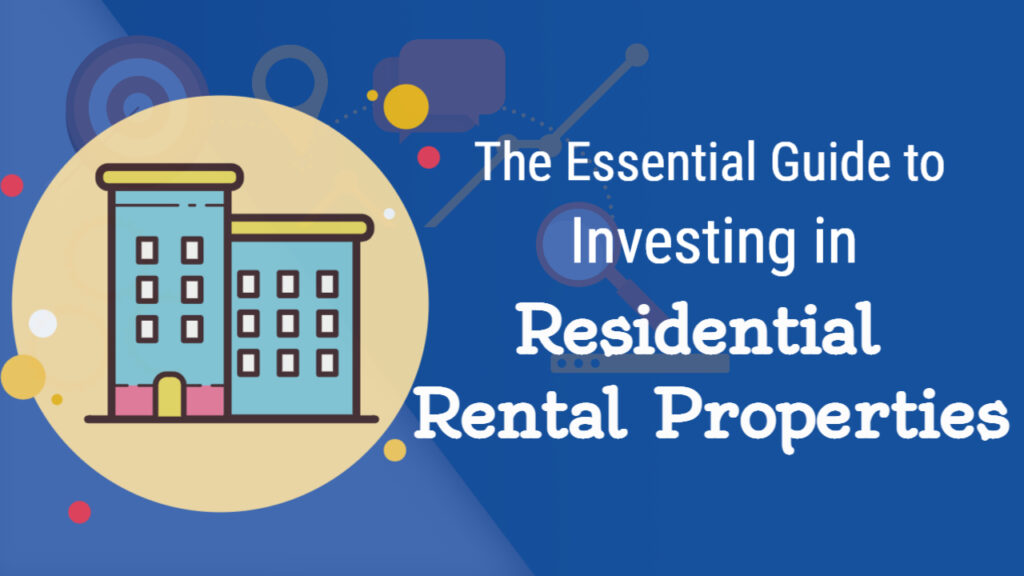The Essential Guide to Investing in Residential Rental Properties
Investing in a residential rental property is one of the best ways to earn a good income. However, investing in real estate isn’t just about buying a property and watching everything work itself out; there are certain basics of purchasing and managing rental properties that you need to know before getting into the business. If you do not take time to fully understand these fundamentals before investing in the business, chances are that the business will fail. To make sure that your first investment property is a resounding success, we have come up with this guide that will assist you to start your rental business on the right note.

Why Investing in Rental Property is a Good Idea
The main reason why investing in rental property is a good idea is that you can expect two kinds of return. The first one is that if the value of the property that you invest in increases with time and you manage to make some significant improvements, it means that it will appreciate in the long run. Such an investment can also provide appreciation over time if you pay down your mortgage, thus increasing equity.
Second, there is a potential of benefiting from an ongoing return through positive cash-flow – monthly rentals from your tenants that surpass your general monthly expenses for property maintenance.
Earning Passive Income from Residential Property Rentals
Investing in rental properties is a good way of earning passive income. Money that is earned without investing time into a business on a daily basis is referred to as passive income. Although you might have to invest a lot of time and effort in the beginning to establish a rental property business, once it has been established, you will be getting passive income for years to come.
If you are considering becoming an owner and manager of a rental property, you have to start by carrying out a lot of research in the area that you plan on buying the property. You can begin by checking the available rental units in that area. That way, you will have a rough idea of how much to charge in rentals.
There are also specific laws that you will need to adhere to as a landlord. The housing laws that you will have to learn about will depend on the state which your property will be in. To avoid landing yourself in serious legal trouble, you have to make certain that you do not breach the housing laws.
What Tax Benefits / Deductions can You Expect
Disclaimer: The information provided in this guide is for educational purposes only. If you are seeking tax advice, please seek a tax professional.
As an owner of an investment property, you can expect several tax benefits. These are available in the form of tax deductions which can reduce your annual tax bill. These deductions are important because they can determine whether you will get a positive cash flow or not.
The important thing to note is that as owner of a rental property, you will only be allowed to claim deductions on the property if there are tenants renting the property and the premises is available for rent. Only a portion of your business expenditure can be claimed.
There are several tax deductions that are available for residential rental properties, and these include:
- Rental advertising costs
- Council Rates
- Loan Interest
- Strata Fees
- Land Tax
- Building depreciation
Where you Invest Matters
There are a number of criteria that you will have to take into account as you search for the ideal rental property to invest in. If your main goal is to invest in a residential property such as condo or a single-family residence, it is best to look for the property in a neighborhood with houses that generally appreciate in value. The ideal location should also have good schools and low crime rates.
Another important consideration is what type of investment property will generate positive cash-flow. At the end of the day, the whole idea behind such an investment is to make money. So, you want to make sure that you get an idea of how well the property can generate income before you even purchase it.
Consider Your Budget
If you have plans to purchase an investment property, you want to make it a point that you come up with a sustainable budget – one that you can actually follow. The key thing to remember when it comes to property investment budgeting is that you have to make sure that you spend less than you earn. If you are a first-time investment property buyer, the following budgeting tips can assist you to reach financial success in the rental business:
- Set precise short and long-term goals – Make sure that the goals you set for yourself are measurable, attainable, relevant and can be achieved in a certain time frame.
- Consider your salary and income – A sustainable budget is one that takes into account your salary and income. You must know your exact gross salary, net salary, the actual money you earn prior to tax and your take home money when tax has been deducted.
- Analyze the property – To avoid costs that you would not have budgeted for in the future, make sure that you investigate the condition of the property thoroughly. You can hire a professional inspector to do the job for you.
- Break down the costs associated with the investment – You should know all the upfront and ongoing costs associated with the investment purchase.
Buying a Turnkey Rental vs a Fixer Upper
One of the key considerations to make as someone looking to invest in residential rental properties is whether you want a turnkey or fixer upper property. A turnkey property is one that is move-in ready. Turnkey homes do not require improvements or repairs. A fixer-upper on the other hand, is a home which requires repairs and improvements; it is not move-in ready. So, you have to decide whether you want to invest in a turnkey home which requires a higher figure, or you want to invest in a fixer-upper property which will require additional expenses.
While the main benefit of buying a turnkey home is that it is ready for tenants to move in, the benefit of choosing fixer uppers instead is that they offer the opportunity for future returns. If you opt for a fixer upper, you can increase your returns by flipping the property once you have completed the repairs and improvements.
The main downside of a fixer upper is that things will not always go as planned during construction. You might end up spending more that you anticipated on things such as electrical and plumbing projects, and such projects might take longer than planned.
At the end of the day, both choices present great opportunities for a first-time investor in residential rental property, especially if you are not constrained by time or funds.
Should I get a Condo or a Single-family Home
If you are considering making a real estate investment, one of the main questions to ask yourself is whether you should buy a single-family home or a condo. The truth of the matter is that both options have their pros. Factors such as location, expected annual return and market will help to determine the property that will work best for you.
The main reasons why people usually invest in single-family homes as opposed to condos include:
- Potential for appreciation – Single-family homes typically appreciate more when compared with condos.
- There are no condo fees – Because of condo fees, it is more expensive to own a condo that a single-family home that is a similar size.
- No restrictions on use – Unlike condos that may have restrictions on how you can use the property, with a single-family home, there are no restrictions.
The main reasons why other people prefer investing in condos are:
- You can get a condo at a price that is less than its assessment value.
- You can get a packaged deal – if money is not an issue, you can buy more than one condo at a time, with some sellers reducing the asking price if you buy more units.
What is HOA and How Does it Reduce the Amount you Spend on a Rental Property
HOA stands for Home Owners Association. This small governing body’s main function is to manage a residential community. It is the role of the association to make certain that every homeowner in the community keeps particular standards in the community for the advantage of all. You automatically become a member of the HOA the moment you buy a home which the association oversees.
And, becoming a member means that you will have to pay association fees monthly, quarterly, or annually. This money is for the maintenance of community areas such as playgrounds, parks and pools. Properties that you will normally find in HOA communities include condos, single-family homes and townhouses.
Investing in a property that is within an HOA community has the advantage of reducing the amount you spend on rentals. Basically, such a property can minimize your rental property upkeep charges; you won’t have to worry about the maintenance of your property’s exterior. This is because HOA fees generally cover things like pest control, lawn mowing, plumbing, landscaping, snow shoveling and trash removal just to mention a few. Paying for such upkeep in one lump sum can be cheaper than paying a lot of people to handle the various tasks.
Location is an Important Consideration
When looking for the perfect rental property to invest in, there are several factors to consider, one of them being location. And, focusing on the location, there are a number of factors that you will have to consider, including:
The Neighborhood
Because your goal is to make good money from your investment, you have to ensure that you buy the investment property in a good neighborhood. The type of neighborhood in which you purchase the property will have a huge impact on the kind of tenants that you will attract and how frequent the property will be vacant. For instance, a property close to a college will attract mostly college students. And, during school holidays the property will most likely be vacant.
School Districts
There is a chance that your potential tenants might have school going kids or they may have plans to have children in the near future. As such, you want to ensure that if you find an investment property that is close to a school, that you investigate the school to see if it is a reputable institution or not. If it is not a reputable school, that fact alone can affect the value of your property.
Crime Rates
Even though you might find an investment property in a neighborhood that is generally good, if it is next to an area known for its high levels of criminal activity, that can also affect the value of the property. And, no one likes to live in a neighborhood that is close to a criminal activity hot spot. Instead of basing your decision on what the seller tells you, get accurate crime statistics of your neighborhood of choice and the surrounding areas form the police or from the public library.
Conveniences
You also want to ensure that you buy a rental property in an area with most of the conveniences or amenities that people want. While there are some people who don’t mind living 15 or more miles away from shopping malls or their workplace, the majority of people prefer to live close to malls, public transport hubs, gyms and close to where they work. As an investor of residential rental properties, make sure that you buy a property in a neighborhood where people actually prefer living.
Equity vs Cash Flow
When it comes to financing real estate, you have to make sure that you always have cash. You want to always have liquid money in the event that something goes wrong. For instance, a plumbing issue can come up at any time and you will need money quickly. Equity will not benefit you much should you need money quickly. You would need time to sell the asset to get the money; which is very inconvenient in emergency situations. So, in this business it is better to have cash as opposed to equity.
What is Cash-on-cash Return
Cash-on-cash return or CoC is a financial calculation that is used when you want to compare potential returns from a real estate investment. Expressed as a percentage of the amount invested, this useful calculation measures the net cash flow that is generated by an investment property.
What is Considered a Good cash-on-cash Return
Although this is not necessarily the same for every investor, what is ordinarily considered to be a good cash-on-cash return is a minimum of 10% of the total cash that was invested.
What is the Cap Rate
The capitalization rate, commonly referred to as the cap rate, is the profit that is made from the net income created by your investment property. Alternatively, it can also be the rate of return an investor makes from a property brought using cash. It is important to calculate your expected cape rate before you purchase a rental property. That way, you will know beforehand if you will get a good return on your investment should you proceed with the purchase.
What is a Good Cap Rate for a Rental Property
Generally, a good cap rate for a rental property is one that is anywhere between 8% and 12%. Of course, like any other investment property calculation, a good cap rate will depend on a number of factors, including:
- Location – a property that has a 4% cap rate in a high-priced area like New York City might actually be the norm. In a low-cost area on the other hand, you will find that the typical cap rate will be 10% or higher. So, location can determine what is considered a good cap rate.
- The current rental income being generated by the property.
- Future appreciation of the property.
- Risk tolerance.
- Future rental forecast.
How to Determine a Good Price Range in a Certain Location
To come up with the rental price, you first have to figure out how much it will cost you to run the rental property every month. You will have to factor in your mortgage payments, as well as any other expenses you might have; for instance, HOA or condo fees. As soon as you have a monthly figure, you can proceed look at other rental properties in your area that have the same value as yours to compare rentals before setting your price.
What is the Typical Monthly Cash Flow Per Rental Property
In order to determine income from an investment property, you have to calculate your margins. However, on average, you can expect to get a return of at least 10%.
What Resources can I use to Find Rental Properties?
Whether you are a first-time investment property buyer or you have been in the rental property business for a while, it is important to know how to actually find the rental properties that you can invest in. In this age of major technological advancements, the best way to go about finding investment properties is to turn to online databases. Websites such as Zillow.com and Realtor.com should be your starting point because they give you the opportunity to filter the desired properties based on the qualities that you will be looking for.
Zillow.com
There are reasons why Zillow is so popular. When your property is listed on Zillow, it will be exposed to millions of consumers and agents are able to advertise skills to a bigger audience. Consumers also have access to properties that are not represented by agents and premier agents are given a WordPress website. The downside of working with Zillow is that its property valuations tool called Zestimate, is sometimes inaccurate, misleading sellers and purchasers.
Realtor.com
One of the websites to turn to if you are looking for residential rental properties is realtor.com. It is the National Association of Realtors’ official website. The benefit of using this platform to find the property that works for you is that it allows you to search through a plethora of listings. These listings are compiled from more than 800 MLS databases all over the country. There are other features that make this one of the best resources to find a rental property. One such feature is the home value tool. With this feature, all you have to do is to type in a zip code or street address and you will be given the assessed value of properties in the area. This information comes in the form of a report; therefore, you have to supply your phone number or email address in order to get the report.
Real estate agents
Real estate agents are professionals who assist people to buy and sell property. If you are planning on investing in a residential property, one of the best ways to go about it is to hire an estate agent to assist you; especially if you have time constraints. The agent will receive a commission once the transaction is complete; which is a percentage of the purchasing price.
Different Ways to Finance Rental Properties
If you are planning on investing in rental property, it is necessary to note from the onset that it is generally more difficult to finance a rental property than it is a home or primary residence. What mainly distinguishes financing an investment property from financing a primary residence is the amount required for the down payment. If you want to buy your home and you have string credit you can find a mortgage lender who will allow you to pay as little as 3% as your down payment. However, when it comes to investment properties, the down payment must be at least 20%.
Having said that, there are several financing options that are available for rental properties. For instance, you can request for ‘owner financing’ or ‘seller financing’, whereby the owner of the rental property acts as the mortgage company or bank. And, as the investor you make an initial deposit towards the purchase of the property, and then you promise to settle the balance by making specific monthly instalments – the same way you would make the payments if you had a mortgage. Although this is not the conventional way of doing this, the transaction will have an escrow company and agents, mimicking the traditional mortgage arrangement.
Getting Landlord Insurance
If you get a good property, in a good area, chances that you will get a positive cash flow and that your property will increase in value over time are very high. But you should take seriously the issue of potential threats. As the landlord, you might find yourself in a situation where you have bad tenants who do not handle the property right or who always pay the rent late.
Therefore, a key considering when venturing into the property business is getting landlord insurance. Should you experience losses of any kind, you will know that you will be covered by your insurance. Basically, the main purpose of landlord insurance is to protect landlords against many of the risks that they may face.
How Do I Choose the Right Insurance?
To select the best policy for you, you need to do the following:
- Assess the coverage that you think you may need – This entails making the decision regarding the features that you want your policy to have based on the value of your property and its contents. You can choose coverage for both the building and its contents or you can simply get coverage for the building only. How much you will pay will depend on the coverage that you want.
- Shop around – Don’t just settle for the first insurance provider that you come across. It is important for you to compare the coverage and benefits offered by several providers before you select the best insurance provider.
Do I Need to Get Flood Insurance?
An important step to take before purchasing a rental property is to check if the property is in a flood zone. You can make use of the flood map provided by the Federal Emergency Management Agency (FEMA) to see whether or not it is in a flood zone. In the event that the building is in a flood zone, you will have to get flood insurance. And, flood insurance will cost you between $200 and $800 annually.
Getting Started with AirBNB
AirBNB vs Traditional Rentals
Before you purchase an investment property, you will also have to decide exactly how you want it to generate income. Basically, you will have two choices; either you opt for the traditional rental or Airbnb.
AirBNB – If you go for the Airbnb it means your property will be available for short term use. Airbnb is basically a third-party platform which promotes investors’ listings for the short-term use of their properties. It will also take care of the payments, meaning all that you are required to do is to list your property.
Traditional rental – If you choose the traditional rental listing, it means that you want a long-term investment that allows you to rent out your property for a period of 6 months or longer. Because you will be a landlord, it will be your responsibility to promote your rental business and to collect the rental payments. You also have an option to hire a property management company to manage the property and collect the rentals.
The Pros and Cons of Investing in Properties for AirBNB
If you are thinking of listing your property as an AirBNB, it would be in your best interest to consider the pros and cons of investing in such a property.
AirBNB Pros:
- Term Flexibility – Airbnb is a great option for someone planning to rent out their property on a part-time basis. For instance, homeowners that have a vacation home. They can rent out the property when they are not using it.
- Pricing Flexibility – you will also be able to set the rates that you want on Airbnb, the kind of rates that will enable you to reach your financial goals. With a traditional rental on the other hand, you are not able to change the rental amount until the lease period is up.
- Protection for hosts – another benefit of choosing Airbnb is that as the hosts, you will be offered insurance cover of as much $1 million in damages. Meaning you will be protected in the event that a guest causes damage to the property.
Airbnb Cons:
- Damages – Despite the fact that your property will be covered by an insurance policy, with an Airbnb you don’t have much of choice when it comes to the guests that will be making use of your property; although some of them will be great, you can always expect some bad apples. And, some owners do not like having to deal with the stress associated with potential damages.
- Inconsistent income – Although you can get great returns from an Airbnb, the profit might not be as consistent as you would expect it to be. Your average income will be determined by factors such as your location and the events that normally take place in that location.
- Home share regulations – Potential investors must note that although Airbnb have gained a lot of popularity over the years, there are cities that have come up with regulations that limit the number due to various reasons. So, make sure that as a potential investor, you find out if there are such limitations in the city that you are planning to invest in.
Cash flow from AirBNB vs Traditional Rentals
In terms of cash flow, it seems that AirBNB are more lucrative when compared to traditional rentals. This is because Airbnb have more flexibility and income potential. Should you become a residential rental property owner, you will find that you will get more income from the short-term listing.
Plus, if you are someone who wants to start getting returns soon after beginning operations, you should opt for the Airbnb. Chances that you will get your first guest booking quickly are quite high. However, in order for you to maintain a steady cash flow with short-term rentals, you must know how to manage rental income that is not consistent.
Quick Tips for Managing Your Rental Property
As the landlord, you will have a responsibility to manage the tenants, the property and finances. The following tips will help you to manage your rental property:
- Managing Tenants – In order to manage tenants well, you must have good people skills. This is especially true when dealing with tenant complaints. And, the best way to gain people skills is to find out what the typical complaints are and learn how to address them.
- Managing the Property – It will be your responsibility as the landlord to ensure that your property is well maintained. Although you might not be in control of how the tenants end up using the property, your role is to ensure that your rental property is safe and habitable.
- Managing Finances – Unless you hire a property management company that will handle the financial aspect of your business, you have to make sure that you collect the rentals and manage expenses well.
Is Hiring a Property Management Company Necessary
Owners of investment properties have a choice to run the rental business on their own or to hire a property management company. The third-party company will basically manage the property for you. This means that you will not have control over the daily operations of the property.
Pros and Cons of Hiring a Property Management Company
The following are some of the benefits of hiring a property management company to assist you:
Reduced management responsibility – it will be the responsibility of the company to meet with potential occupants, take calls from the tenants, pay bills and to make sure that the building is well maintained.
Vendor savings – Because property managers normally have their own vendors that they turn to when it comes to property maintenance, chances that the vendors will charge fair prices to get work done are quite high considering that the manager will be a repeat client.
The drawbacks include:
The likelihood for increased cost – although they help owners in so many ways, property managers can sometimes minimize your investment income due to the fact that they might have pricey base rates, or they may base their charges on the gross rentals collected.
Minimized attention – Sometimes, no matter how good the third-party might claim to be, they will never run the property in the same way that you would. If you have a specific way that you would want your property to be managed, it is best to manage it yourself.
How to Manage the Property Yourself
Should you make the decision that you want to manage the property yourself, there are certain steps that you will have to take if you want your business to be a success, and some of them are discussed in the following section.
Responsibilities
Your responsibilities as the manager of your property will include:
- Avoiding tenant turnover – this involves making sure that you keep your tenants happy and eager to stay for a long period of time or so that they will want to keep choosing your rental property in the future. Make certain that you attend to their complaints quickly and that you avoid bad tenants, that will be bad neighbors.
- Adhere to landlord-tenant laws – take the time to learn about all the landlord-tenant laws in your state, and make sure that you follow them.
- Pay taxes – one of your main financial obligations as a landlord is to pay taxes. If accounting is not your area of expertise, you can hire an accountant who specializes in investment property tax law to assist you.
Handling Maintenance
Make certain that you follow the health and safety standards as required by the laws of your state. For instance, the common areas must be kept in good condition and there must be enough areas to throw away the garbage. Repairs must be attended to as urgently as possible.
How to Handle Payments
For you to ensure that you get rental payments on time and in full, it is necessary to come up with a system that will allow you to keep track of your income. In order to keep a record of your income, payments in the form of checks, debits, email transfers and money orders would be ideal. You must also decide how you want to collect the rentals; in person, online or by mail. Come up with a system that works for you and don’t forget to give your tenants receipts.
Accepting Cash
Running a rental business requires cash for those emergency situations. For instance, you might receive a call from a tenant telling you that a pipe has burst and a plumber is required immediately. In those instances, liquid money is essential.
Should I use Venmo
Nowadays, there is a reduced need for payment options such as cash and paper checks because of mobile wallets or applications such as Venmo. These applications make peer-to-peer (P2P) funds transfers quite convenient. However, Venmo is not the best platform to use when it comes to collecting rentals. This is because it will be very costly for you in the long run.
For instance, if you opt for Venmo to collect rentals, you have to make sure that you are making use of a business account. And, the business account comes with extra fees. Also, if you make use of Venmo, you will not have control over when your tenants will make the payments; you have no way of compelling them to pay their rent such as sending them reminders, and you cannot automate payments.
Should I use Cozy.co
Cozy is a property management platform that offers services to landlords and renters. This online property management portal assist landlords, among other things, to list their properties, as well as collect rentals. When it comes to property listings, this portal assist landlords to advertise their rental properties with photos, amenities and lease terms. As for rent collection, all that is required is for your tenants to sign up, allowing you to collect rentals automatically.
What are the Pros and Cons of using Cozy.co
The benefits of using Cozy Property Management include:
- Having an automated system for paying rent.
- No waiting in line at the bank to pay rent.
- Email reminders to tenants so that they pay rent on time.
- There is an add-a-charge feature which makes it easy to change frequent payments.
Some of the disadvantages include:
- The portal does not have a payment refund feature.
- There is no mobile app available for landlords.
Scaling Your Rental Property Income
To become an experienced investor, it is important to know how to scale your income; you must know how to operate with monetary limitations. In order to promote the growth of your rental business, you can consider some of the following strategies:
30-year fixed rate mortgage – this will allow you to pay a reduced interest rate on the property. This means extra money for reinvestment.
Hiring a property manager – as you buy more rental properties, it will be impossible to manage them all efficiently. Hiring a property manager will take the burden off of you.
Living Frugally – make sure that you use the income you receive from the rental property to reinvest into the business.
The Cash Snowball Effect
You might think that in order to invest in a rental property requires a substantial amount of wealth. But that is not the case; it is all about starting small and working your way up. The snowball effect is a concept that emanates from the actual building of a snowman. Basically, when you are building a snowman, you begin with a little bit of snow and then roll it along until it starts to grow.
Essentially, that is how you should approach real estate investing; start with one rental property and then go on from there. When you have made enough money to invest in another property, you can go ahead and purchase another rental property, basically creating a snowball effect.
The 5-10 Properties Program
Fannie Mae’s 5-10 Properties Program allows you to get financing for 5-10 properties at a time. However, to be eligible for this program there are strict criteria that you will have to meet, including;
- Being the owner of between 5 and 10 residential properties.
- Putting down a down payment of 25% for the first unit, then 30% for 2-4 units.
- 30% equity for each property.
- Your minimum credit score should be 720.
- No foreclosures or bankruptcies in the past 7 years.
Selling a Rental to Invest in Another Desirable Property
You don’t just wake up one and decide to sell your immovable property; a major investment such as a rental property. There has to be a very good reason to do so. And, one of the main reasons why investors make the decision to sell their rental property is so that they can invest in an even bigger and more profitable one.
Usually, the right time to sell would be when there is a big supply of rental property in the pipeline. For instance, if you see a huge pipeline of condos in the next couple of years, this should ideally be followed by downside pricing pressure. The best move would be to make the sell before the market is flooded.
Reducing the Impact of Capital Gains Using a 1031 Exchange
You might have to pay capital gains tax when you sell an investment property. This tax applies when an investor sells an investment property for a price that is more than what they bought it for. However, there is way to reduce capital gains tax on rental property, or to even avoid it. You can do this through the use of a 1031 Exchange.
According to section 1031 of the Internal Revenue Code, you can defer the payment of capital gains tax on a rental property by making use of the proceeds from the sell to buy a different rental property. So, until the sell of the replacement property goes through, you don’t pay the tax. However, you have to ensure that the property you purchase is similar to the one that you sold, as this is a form of exchange.
Without knowing the rudiments of purchasing and managing a residential rental property, your dream of someday becoming a real estate mogul might never be realized. It is very important that you take all the necessary steps to ensure that your business will be a success; you really can’t afford to cut corners. Just like how you would follow specific steps when buying a home for the first time, you should also follow specific steps when investing in a rental property.








